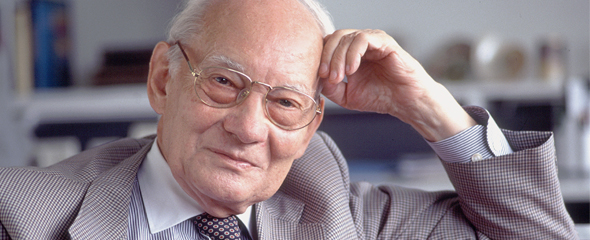Manfred Eigen received more honours than practically any other German scientist. Eigen was awarded the Nobel Prize in 1967 for his work on ultra-fast chemical reactions; he was the first scientist to measure the miniscule durations of such processes. In addition to the Nobel Prize, which he received at age of 40, he was also honoured with a large number of other renowned awards, including the Otto-Hahn Prize for Chemistry and Physics (1962), the Paul Ehrlich und Ludwig Darmstaedter Prize (1992) and the Lifetime Achievement Award of the Institute of Human Virology in Baltimore (2005).
Prof Manfred Eigen also worked on questions of evolution and is considered a co-founder of evolutionary biotechnology and one of the pioneers of molecular biology in Germany. He founded the Max Planck Institute for Biophysical Chemistry in Göttingen and was one of the founders of the predecessor institute of today's Helmholtz Centre for Infection Research. Together with Prof Hans Herloff Inhoffen, who was an expert at the Technische Universität in Braunschweig in the 1960s, he supported the idea of a molecular biology institute in Braunschweig.
Eigen immediately recognised the scientific opportunities offered by such an instituion and, as a lateral thinker, connected these with the challenges of the time. The Institute for Molecular Biology, Biochemistry and Biophysics (IMB) was founded by Inhoffen and Eigen in 1965, later transformed into the Gesellschaft für Molekularbiologische Forschung (GBF), and is a prime example of how the opportunities afforded by interdisciplinary research were recognised early on in Braunschweig.
"With the death of Manfred Eigen, we lose an exceptional thinker, ingenious researcher and great advocate for basic scientific research."
“Eigen always placed basic research in the context of major questions that need to be answered, such as a fundamental understanding of enzyme reactions and catalysis, which paved the way for successful biotechnology, and enabled the establishment of institutes such as the GBF. Today, the HZI focuses its research on basic scientific research that rapidly transfers results into applications – with a focus on successfully combating infectious diseases,” says Prof Dirk Heinz, Scientific Director of the Helmholtz Centre for Infection Research.
Career of Manfred Eigen
Manfred Eigen was born in 1927 in Bochum. After the Second World War, he studied Chemistry and Physics in Göttingen with Werner Heisenberg and Wolfgang Paul, among others. At just 24 years old, he completed his doctorate in physical chemistry under the supervision of Arnold Eucken. In 1953, he became the assistant to Karl Friedrich Bonhoeffer at the Max Planck Institute for Physical Chemistry, where he researched the measurement of ultra-fast reactions and developed the relaxation methods. Four years after the first presentation of these methods, the Max Planck Society appointed him a Scientific Member in 1958 and he became Director and Head of the Department of Chemical Kinetics at the MPI for Physical Chemistry in Göttingen. After the foundation of the MPI for Biophysical Chemistry, he headed the Department of Biochemical Kinetics from 1971 until his retirement in 1995. However, for many years after his official retirement, Eigen continued to play an active role in research at both the MPI for Biophysical Chemistry and the Scripps Research Institute in La Jolla (California, USA). From 1965 onwards, Eigen also held an honorary professorship at the Technische Universität in Braunschweig.

